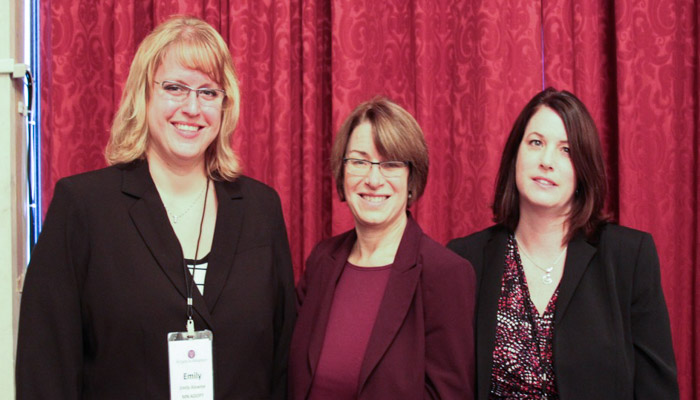St. Thomas Master of Social Work alumni Emily Alewine '08 and Rachel Walstad '93 have good reason for mixed feelings about the state of adoption services in 2016. On one side is the ever-present list of challenges: underpaid and overworked social service workers; under-supported families who have adopted, many of them without the proper education up front of what they’re truly undertaking; under-funded adoption infrastructures throughout the United States; and thousands of foster kids in need of families.
They have plenty of reason to be optimistic though, too, in large part because of the work they do day in and day out. Both work for MN Adopt, a St. Paul-based organization that has been around since 1980 and provides support services for adoptive families of all kinds in Minnesota. These days, Walstad (MN Adopt’s executive director) and Alewine (MN Adopt’s HELP program manager and clinical specialist) are changing their organization’s way of operating. In recent years MN Adopt has expanded beyond its original focus of just foster care advocacy and support – and may now lead the entire nation forward with a new model for adoptive services.
That aspect is in large part thanks to HELP, “which is all about post-adoption support linkage. Individualized resources for the adoption community,” Alewine said. The program is funded by the Minnesota Department of Human Services "to improve access to post-adoption clinical services to Minnesota adoptive families." While the program started in 2011, it has taken off since Alewine arrived in 2013 to lead it.
There are many nuances to the services it provides, but put plainly: HELP, as an outside representative, connects families with the right people at the right times to try to make the adoptive situation as successful as possible. Finding the correct specialized support is not an easy task and the systems can be difficult for families to navigate, Alewine said, so MN Adopt’s assistance has been crucial. (HELP also supports "county workers, practitioners, case managers and other professionals by providing case consultation, referrals to adoption-competent practitioners and resources.")
“That’s a theme across the country … that [post-adoption service] is lacking,” Alewine said. “Either states don’t have anything similar, or have programs that can provide to a certain extent and then exclude, say, families that adopt internationally because they don’t have the funding for it.”
Because it’s an impartial organization outside the system, MN Adopt can be a genuine advocate for adoptive children and their families, as well as for workers providing support services.
“We’re neutral and we’re collaborative,” Walstad said. “We get to work and talk with the different organizations and say, ‘How can we all work together and do more for these kids and families?’”
National recognition
As surprising as it may sound, organizations and roles like these simply haven’t existed in other states' adoptive systems, Alewine said.
“I was doing my due diligence [after starting in 2013] and looking at different states, and as I was doing it I was thinking, ‘Maybe my research is really crappy.’ Or I was realizing there are such huge gaps. I’m a smart lady, I can figure that stuff out, and there was just zip,” Alewine said. “A few states had interesting models that seem to be good, but they don’t function in the same way we do. What we’ve noticed is being able to listen to these families and workers, and because we’re such a disconnected entity … we’re able to really report on the larger, broader themes we’re seeing. With that voice backing it that’s a lot more powerful. We’ve had people be very open to the messages we’re sharing and the needs of where we’re seeing it could go.”
“Those people” have included Sen. Amy Klobuchar and Rep. Tom Emmer, who nominated MN Adopt last year for the Angels in Adoption award from the Congressional Coalition of Adoption Institute. While Alewine and Walstad were in Washington, D.C., to accept the award, they had the opportunity to meet with federal policymakers and highlight their model.
“People were asking the right questions about what needs to be done,” Walstad said.
“Minnesota is very invested in the adoptive community and wants to be a forerunner for post-adoption services,” Alewine added. "There are national leaders looking at our programming model to potentially be a model for other states, because of how we’re able to function fiscally and what the payouts are, which are huge. We have families that testify from first call to a couple years later, where they are now because we’ve been able to help connect with them with the right resources. It’s very powerful stuff."
Minnesota has historically been one of the most active states for adoption in the country, Alewine said, so it has seen the growth and growing pains in the field of adoption.
“When you think back to 50 years ago, kids weren’t even told they were adopted. You get these death-bed confessions. That’s the society we’re coming from, adoption as a secretive experience,” Alewine said. “That’s not how it is now and not how it needs to be. It’s shifting that in society and that kind of shift takes a long time.”
The efforts of people like Alewine and Walstad are a big part of that shift and will continue to be moving forward.
“Right now there are 499 kids in [Minnesota foster] homes and we’re trying to be a voice for those kids and help them achieve permanency and find a family. It’s a wonderful mission and that’s still one of our main purposes, but that’s not enough,” Walstad said. “These families are created and they need a lot of help. There’s a lot of excitement whether it’s orphans or kids internationally joining homes, or kids coming out of foster care and joining homes. It’s [historically] been, ‘Congratulations, you’re a family, call us if there’s any trouble.’ We need to be doing more.”







